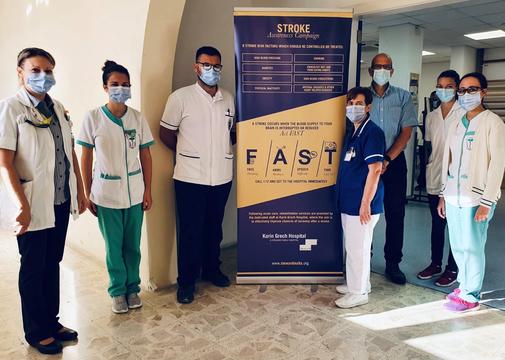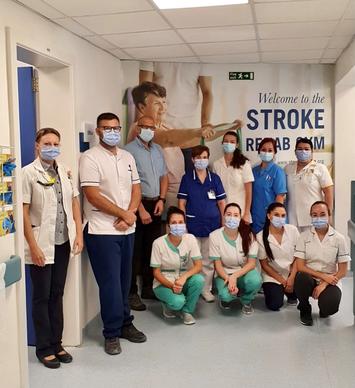BY GABRIELLE RANSLEY, SLP, ON BEHALF OF RHKG STROKE UNIT, RW8 – KARIN GRECH HOSPITAL
“….as I lie down in bed staring up at the bright light, I see two strangers with a concerned look peering at me. They are mumbling something but I cannot make much sense of what they are saying. Too many words at the same time! Too fast! I ask them to turn off the light. Why aren’t they listening to me? Why are they instead offering me water, mixed with some sort of white powder? I repeat ‘Turn off lights’ a bit louder! Why are they asking me if I am feeling cold? I have to make a concentrated effort to speak and my voice is so weak. I repeat over and over again…why are they acting as though they cannot understand me? Now they are checking my nappy. My what?! Nappy? I don’t need a nappy as I can very well go to the bathroom on my own. Take it off me now. How humiliating can this be!
The reality suddenly hit me. I cannot even scratch my own nose, my legs are heavy and feel numb and my bottom is sore from lying down for so long. I cannot move when I want to. Why is my speech sounding so weird? I am mumbling sounds without making any sense. What is happening to me? I cannot even control my saliva, it is drooling down my chin and my top is so damp.
I come to realise that these people around me will be caring for me, but I do not want them! I refuse to have any form of help or therapy. I am so frustrated and I know what I want my body to do but it is not following my commands. How maddening! Why is it that now the only words that come out from my mouth so clearly are rude words? I never said a swear word in my entire life! Why am I crying so often? I am a strong person. Everyone relies on me at home. I am independent and I need to be back home immediately. Why am I so helpless?”
This is a real-life experience of a stroke survivor. As sad and scary it might sound, such an occurrence is very common and can happen to anyone, anywhere and at any age.
However, on a more positive note, all this can be avoided. There are certain risk factors which can be controlled and steps we can take to minimise the harmful effects of a stroke.
As we unite with the rest of the world to remember World Stroke Awareness day on 29th October, it is the mission of all the staff of the RW8 stroke team at the Karin Grech Rehabilitation Hospital, to help raise this awareness.
 Please take a minute of your time to go through these points and educate yourself further so that you can protect yourself or your loved ones. The most common steps to reduce the risk for a stroke are:
Please take a minute of your time to go through these points and educate yourself further so that you can protect yourself or your loved ones. The most common steps to reduce the risk for a stroke are:
1. Lower your blood pressure: Monitoring blood pressure and, if it is elevated, seek medical advice to treat it as you might require medicine. Also reduce salt and fats in your diet. Increase intake of fruits, vegetables, fish, and whole grains. Exercise and quit smoking.
2. Lose weight if overweight: create a personal weight loss strategy with the help of a dietician and exercise.
3. Increase exercise: Exercise at least 30 minutes a day.
4. Don't drink alcohol or do it in moderation: Limit intake to one glass of alcohol a day and make red wine your first choice, as it is thought to protect the heart and brain.
5. If you have atrial fibrillation, get it treated: If you have symptoms such as heart palpitations or shortness of breath, see your doctor for an examination. You may need to take an anticoagulant drug (blood thinner).
6. Treat diabetes: Keep your blood sugar under control by monitoring your blood sugar and by dieting, exercising, and taking the recommended medicines as directed by your doctor.
7. Quit smoking: Smoking cessation is one of the most powerful lifestyle changes that will help you reduce your stroke risk significantly. Use quit-smoking aids, such as nicotine pills or patches, counselling, or medicine. Don't give up!
F.A.S.T.
If you think someone might be having a stroke, act F.A.S.T. and do the following simple test:
F—Face: Ask the person to smile. Does one side of the face droop?
A—Arms: Ask the person to raise both arms. Does one arm drift downward?
S—Speech: Ask the person to repeat a simple phrase. Is the speech slurred or strange?
T—Time: If you see any of these signs, call 112 right away.
Note the time when any symptoms first appear. The 10 symptoms of stroke include:
- Confusion
- Difficulty understanding
- Dizziness
- Loss of balance
- Numbness
- Severe headache
- Difficulty speaking
- Difficulty walking
- Visual problems
- Overall weakness
Do not drive to the hospital or let someone else drive you. Call an ambulance so that medical personnel can begin life-saving treatment on the way to the emergency room.
Stroke requires immediate medical attention. The sooner treatment is received, the better the chances of survival. It is very important that when you notice the warning signs of a stroke, you immediately go to the hospital. The length of time to seek help will affect your recovery outcome.
 Activities on World Stroke Day
Activities on World Stroke Day
Unfortunately, due to the pandemic, this year, activities within the stroke unit had to be kept minimal. Such activities will include:
- Mass to be held in the ward for patients and staff whilst respecting safe distancing.
- Posters and banners will be set up in the main areas of the hospital to increase awareness.
- A light refreshment drink will be offered to all patients based on safe swallowing recommendations. The drink chosen will be a blueberry smoothie, as the purple colour symbolises the stroke campaign awareness.
During this COVID-19 period, hospitals around the world have reported a decline in stroke intervention due to patients not seeking medical care as they did in the past. On the other hand, these circumstances have taught care givers and professionals how to be resourceful in an innovative manner. We had to learn how to use social media platforms to get across to our patients. Some therapies and consultations were conducted via video conferencing and professionals sought to keep in touch by connecting virtually using different internet platforms, so that an uninterrupted service for follow-up care during lock- down/teleworking period could be provided.
Nowadays we have great opportunities to educate patients and spread news quickly, thanks to the ease of access to medical information, virtual health, and teletherapy/ teleconsultation which are now on the forefront of medicine. Even our own patients can help us to increase public awareness by spreading news and educating those around them
References:
https://www.health.harvard.edu/womens-health/8-things-you-can-do-to-prevent-a-stroke